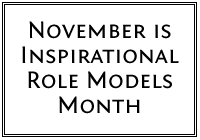 In June, I blogged about Michele Bachmann and the double standard for women politicians. It seems that the media continues to display sexism toward women candidates. Whether it's Hillary Clinton, Sarah Palin, or Michele Bachmann there seems to be an element of sexism even as we approach 2012.
First we had to hear the commentary each time Hillary had a new hairstyle. While this may be appropriate for a First Lady, when a woman is running for political office she ought to be taken more seriously. How often do we critique a male candidate's hair? (Donald Trump doesn't count).
In June, I blogged about Michele Bachmann and the double standard for women politicians. It seems that the media continues to display sexism toward women candidates. Whether it's Hillary Clinton, Sarah Palin, or Michele Bachmann there seems to be an element of sexism even as we approach 2012.
First we had to hear the commentary each time Hillary had a new hairstyle. While this may be appropriate for a First Lady, when a woman is running for political office she ought to be taken more seriously. How often do we critique a male candidate's hair? (Donald Trump doesn't count).
During the Republican debates, Michele Bachmann was accused of not knowing her facts - even when she did. In one debate, she bested Newt Gingrich regarding his involvement in Fannie Mae, yet the media did not make much of her win.
The most recent sexist remark was by John McLaughlin of the McLaughlin Group when he said we have a "Gal Candidate". A GAL? A friend asked me if I would find it offensive if his 87 year old father referred to a woman as a gal. I replied, "No. He's a product of his times. But a journalist and moderator knows better. He's on national TV and is subject to professional standards. He didn't refer to 'guy candidates'".
Language is a mirror into how one thinks. It's difficult to be taken seriously as a woman candidate when you're called a "gal". It's amazing that this kind of double standard is going on in the U.S., when other countries have elected a woman president or prime minister.
As a public speaker and debater, Michele Bachmann has handled herself well by sticking to the facts and not showing a lot of emotion. Will gender always be a factor? Is it possible to evaluate the candidates on their merits, without considering gender? Or will it always color our perceptions?











 Have you ever wondered why some leaders are more inspirational than others? Here's the secret. They speak from the inside out. Where most leaders speak about the WHAT and the HOW, leaders who inspire audiences with their message do one thing differently. They speak about the WHY.
Have you ever wondered why some leaders are more inspirational than others? Here's the secret. They speak from the inside out. Where most leaders speak about the WHAT and the HOW, leaders who inspire audiences with their message do one thing differently. They speak about the WHY.









